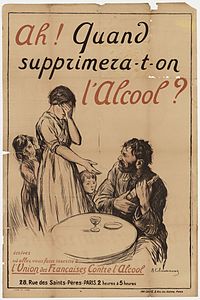
Photo from wikipedia
Risky alcohol use is prevalent among college students. Pre-intervention research has established methods of influencing alcohol cognition and reducing short-term alcohol consumption among students using evaluative conditioning (EC), repeatedly pairing… Click to show full abstract
Risky alcohol use is prevalent among college students. Pre-intervention research has established methods of influencing alcohol cognition and reducing short-term alcohol consumption among students using evaluative conditioning (EC), repeatedly pairing alcohol with emotionally valenced images. Specifically, negative EC promotes negative attitudes toward alcohol, but additional research is needed to understand the range of EC effects and conditions under which it is or is not effective. For example, whether pairing alcohol with positive images promotes positive alcohol attitudes has not been tested. Further, drinking motives may influence the effectiveness of conditioning alcohol attitudes, since these motives are strongly associated with emotional stimuli like those presented in EC. The current experiment tested the interaction of drinking motives (coping and enhancement) and EC valence (negative or positive) on implicit alcohol avoidance. Participants (N = 95) were undergraduate students reporting active alcohol use. Results indicated no main effect of EC condition on implicit alcohol avoidance. However, drinking motives interacted with EC procedures assigned to participants. Those reporting greater coping motives exhibited less implicit alcohol avoidance following negative EC, whereas those reporting greater enhancement motives exhibited less alcohol avoidance following positive EC. Findings indicate drinking motives may influence the effectiveness of EC for altering alcohol attitudes. Negative EC did not promote alcohol avoidance among college students reporting higher coping motives, and positive EC only reduced avoidance among students reporting higher enhancement motives. These results indicate drinking motives interact with situational cues to impact both positive and negative responses to alcohol.
Journal Title: Addictive behaviors
Year Published: 2019
Link to full text (if available)
Share on Social Media: Sign Up to like & get
recommendations!